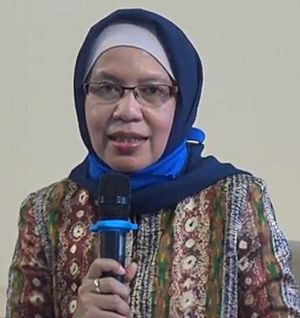Adi Utarini facts for kids
Quick facts for kids
Adi Utarini
|
|
|---|---|

Utarini in August 2020
|
|
| Born | 4 June 1965 Yogyakarta, Indonesia
|
| Alma mater | Umeå University UCL Great Ormond Street Institute of Child Health Gadjah Mada University |
| Known for | randomized controlled trial of the Wolbachia technique for dengue control |
| Awards | Nature's 10 (2020) |
| Scientific career | |
| Institutions | Gadjah Mada University |
| Thesis | Evaluation of the user-provider interface in malaria control programme: the case of Jepara district, Central Java province, Indonesia (2002) |
Adi Utarini is an Indonesian scientist who works to keep people healthy. She is known for her amazing work in fighting dengue fever, a serious illness spread by mosquitoes. She is a professor at Gadjah Mada University in Yogyakarta, Indonesia.
In 2020, the famous science magazine Nature named her one of the ten most important scientists of the year. This was for leading a groundbreaking study that used special mosquitoes to help stop the spread of dengue. In 2021, TIME magazine also named her one of the 100 most influential people in the world.
Contents
From Student to Scientist
Adi Utarini was born in Yogyakarta, Indonesia, on June 4, 1965. She was always interested in medicine and went to study at Gadjah Mada University. After she graduated in 1989, she wanted to learn even more.
She traveled to other countries to continue her education. She earned two master's degrees: one in the United Kingdom and another in Sweden. She then earned her doctorate (Ph.D.) from Umeå University in Sweden in 2002. For her final project, she studied how to control malaria, another disease spread by mosquitoes, in Central Java, Indonesia.
A Groundbreaking Fight Against Dengue Fever
As a professor at Gadjah Mada University, Utarini has focused on controlling diseases and improving healthcare for everyone. She became the leader of a very important project in her home city of Yogyakarta.
Yogyakarta is a busy city where dengue fever spreads easily. Dengue can make people very sick, and there was no cure. Utarini and her team wanted to find a new way to protect the city.
A Clever Idea: Using Special Mosquitoes
Utarini helped lead a project that tested a new method to fight dengue. The idea involved using a natural bacteria called Wolbachia. This bacteria is harmless to humans but has a special effect on mosquitoes. When mosquitoes carry Wolbachia, they can no longer spread the dengue virus to people.
The project had been developed by scientists at Monash University in Australia. Utarini's job was to lead the first major test to see if it really worked on a large scale.
Proving the Method Works
To test the idea, Utarini's team ran a special kind of experiment called a randomized controlled trial. This is a very careful way to check if a new treatment is effective.
Starting in 2016, they divided the city of Yogyakarta into 24 different areas.
- In 12 of these areas, they released mosquitoes that carried the Wolbachia bacteria.
- The other 12 areas were left as they were, to act as a comparison group.
The team then tracked the number of dengue cases in all 24 areas. In August 2020, Utarini announced the amazing results. The areas with the Wolbachia mosquitoes had 77% fewer cases of dengue fever than the other areas.
Disease experts around the world were very impressed. They called the results a huge breakthrough in the fight against dengue, which affects millions of people every year.
Gaining the Community's Trust
A big part of Utarini's job was getting permission from the government and support from the local people. She had to convince everyone that releasing more mosquitoes was a safe and good idea.
She and her team used creative ways to explain the science, like painting murals on walls, making short films, and talking to people directly. The community became very enthusiastic and eager to help, which was a key reason for the project's success.
Life Outside the Lab
Colleagues describe Utarini as quiet but very persuasive. She is often called "Prof Uut" by those who know her. When she is not working, she enjoys hobbies like cycling and playing the piano.
Utarini was married to Iwan Driprahasto, who was also a professor at Gadjah Mada University. Sadly, he passed away in March 2020.
Awards
See also
 In Spanish: Adi Utarini para niños
In Spanish: Adi Utarini para niños
 | George Robert Carruthers |
 | Patricia Bath |
 | Jan Ernst Matzeliger |
 | Alexander Miles |

